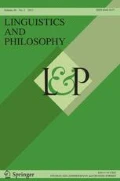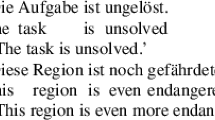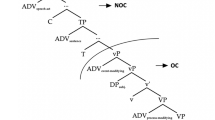Abstract
This article discusses what may be referred to as ``adjectival relatives''in Japanese and related constructions in other languages (such asadjectival passives in English). The most intriguing characteristicof this construction is that the verb contained in it occurs in the pasttense form, but its primary role is to describe a state that obtains atthe local evaluation time, rather than the past event that producedthis state. In fact, in some cases, the putative event that presumablyproduced the target state is non-existent, and the entire constructionreceives a purely stative interpretation. In other words, it is possiblefor an adjectival relative to describe a target state without having itstriggering event. The proposal I put forth in the article states that whatI refer to as an adjectival relative does not have a clausal structure.It rather has a verbal projection (technically a Tense Phrase, or TP). Mod(the modifier head) then combined with TP to yield a MP (modifierphrase), which denotes a property of states that appear to have resultedfrom an event the verb describes. In order to reach this conclusion, I adopttwo additional ideas: (i) Kratzer's (1996) idea that the so-called externalargument of a verb is not really its argument at all; (ii) direct causationdoes not have to be overtly represented in natural language syntax (Bittner1999). Having incorporated these two ideas, the proposal explains therelation between the state that the adjectival relative describes and theputative event as a modal one, thereby accounting for the non-existenceof putative past events in some examples.
Similar content being viewed by others
References
Abe, Yasuaki: 1993, ‘Dethematized Subjects and Property Ascription in Japanese’, Proceedings of the 1992 Asian Conference on Language, Information and Computation, Seoul, Korea.
Abney, Steven: 1987, The English Noun Phrase in its Sentential Aspect, Ph.D. dissertation, MIT.
Ackerman, F. and A. E. Goldberg: 1996, ‘Constraints on Adjectival Past Participles’, in A. E. Goldberg. (ed.), Conceptual Structure, Discourse, and Language, pp. 17–30, CSLI Publications, Stanford University, Stanford, CA.
Bennett, Michael and Barbara Partee: 1972, ‘Toward the Logic of Tense and Aspect in English’, Distributed by the Indiana University Linguistics Club, Bloomington, IN.
Bierwisch, M.: 2002, ‘A Case for CAUSE’, in Ingrid Kaufmann and B. Stiebels (eds.), More than Words. Festschrift for Dieter Wunderlich, pp. 327–353, Akademie Verlag, Berlin.
Bittner, Maria: 1999, ‘Concealed Causatives’, Natural Language Semantics 7, 1–78.
Burzio, Luigi: 1986, Italian Syntax: A Government-Binding Approach, Kluwer Academic Publishers, Dordrecht.
Chomsky, Noam: 1977, ‘On WH-Movement’, in P. Culicover, T. Wasow, and A. Akmajian (eds.), Formal Syntax, Academic Press, New York.
Comrie, Bernard: 1976, Aspect, Cambridge University Press, Cambridge.
Cresswell, Maxwell J. and Arnim von Stechow: 1982, ‘De Re Belief Generalized’, Linguistics and Philosophy 5, 503–535.
Davidson, Donald.: 1967, ‘The Logical Form of Action Sentences’, in Nicholas Rescher (ed.), The Logic of Decision and Action, pp. 81–95, University of Pittsburgh Press, Pittsburgh, PA.
Dixon, R. M. W.: 1982, Where Have All the Adjectives Gone and Other Essays in Semantics and Syntax, Mouton, Berlin.
Dowty, David: 1979, Word Meaning and Montague Grammar: The Semantics of Verbs and Times in Generative Semantics and in Montague's PTQ, D. Reidel, Dordrecht.
Dowty David: 1986, ‘The Effects of Aspectual Class on the Temporal Structure of Discourse: Semantics or Pragmatics?’, Linguistics and Philosophy 9, 37–61.
Dowty, David: 1991, ‘Thematic Proto-Roles and Argument Selection’, Language 67, 547–619.
Enç, Mürvet: 1987, ‘Anchoring Conditions for Tense’, Linguistic Inquiry 18, 633–657.
Fillmore, Charles: 1970, ‘The Grammar of Hitting and Breaking’, in R. Jacobs and P. Rosenbaum (eds.), Readings in English Transformational Grammar, pp. 120–133, Holt, Rinehart and Winston, New York.
Goldberg, Adele E.: 1995, Constructions: A Construction Grammar Approach to Argument Structure, University of Chicago Press, Chicago.
Goldberg, A. E. and F. Ackerman: 2001, ‘The Pragmatics of Obligatory Adjuncts’, Language 77, 798–813.
Heim, Irene and Angelika Kratzer: 1998, Semantics in Generative Grammar, Blackwell, Malden, MA.
Kaufmann, Ingrid: 1995, ‘What is an (Im-)possible Verb? Restrictions on Semantic Form and their Consequences for Argument Structure’, Folia Linguistica 29, 67–103.
Kindaichi, Haruhiko: 1950, ‘Kokugo Dooshi no Ichibunrui [A Proposal for Verb Classification in Japanese]’, Gengo Kenkyuu 15, 48–63.
Kinsui, Satoshi: 1994, ‘Rentai Shuushoku no-ta ni Tsuite [On the Adnominal Modifier-ta]’, in Y. Takubo (ed.), Nihongo-no Meishishuushoku Hyoogen [Adnominal Modifiers in Japanese], pp. 29–65, Kuroshio Shuppan, Tokyo.
Kratzer, Angelika: 1981, ‘The Notional Category of Modality’, in H. J. Eikmeyer and H. Rieser (eds.), Words, Worlds and Contexts, pp. 38–74, de Gruyter, Berlin.
Kratzer, Angelika: 1996, ‘Severing the External Argument from its Verb’, in Johan Rooryck and Laurie Zaring (eds.), Phrase Structure and the Lexicon, pp. 109–137, Kluwer, Dordrecht.
Kratzer, Angelika: 2000, ‘Building Statives’, Proceedings of the 26th Annual Meeting of the Berkeley Linguistics Society: General Session and Parasession on Aspect, pp. 385–399.
Kusumoto, Kiyomi: 2001, ‘The Semantics of Non-Past-ta in Japanese’ in María Cristana Cuervo et al. (eds.), Formal Approaches to Japanese Linguistics 3, pp. 163–180, MIT Working Papers in Linguistics, MIT, Cambridge.
Levin, Beth and Malka Rappaport Hovav: 1995, Unaccusativity: At the Syntax-Lexical Semantics Interface, The MIT Press, Cambridge.
Montague, Richard: 1973, ‘The Proper Treatment of Quantification in Ordinary English’, in J. Hintikka, J. Moravcsik, and P. Suppes (eds.), Approaches to Natural Language, pp. 221–242, D. Reidel, Dordrecht.
Nishiyama, Kunio: 1999, ‘Adjectives and the Copulas in Japanese’, Journal of East Asian Linguistics 8, 183–222.
Ogihara, Toshiyuki: 1996, Tense, Attitudes, and Scope, Kluwer, Dordrecht.
Parsons, Terence: 1990, Events in the Semantics of English: A Study in Subatomic Semantics, MIT Press, Cambridge, MA.
Perlmutter, David: 1978, ‘Impersonal Passives and the Unaccusative Hypothesis’, in J. Jaeger et al. (eds.), Proceedings of the Fourth Annual Meeting of the Berkeley Linguistics Society, pp. 157–189, University of California, Berkeley.
Rodman, Rodman: 1976, ‘Scope Phenomena, ‘Movement Transformations’, and Montague Grammar’, in Barbara H. Partee (ed.), Montague Grammar, pp. 165–176, Academic Press, New York.
Ross, John Robert: 1967, Constraints on Variables in Syntax, Ph.D. dissertation, MIT, Cambridge, MA. [Published in 1986 as Infinite Syntax! Ablex Publishing Corporation, Norwood, NJ.]
Rubin, Edward J.: 1996, ‘The Transparent Syntax and Semantics of Modifiers’, in Brian Agbayani and Sze-Wing Tang (eds.), WCCFL 15: Proceedings of the Fifteenth West Coast Conference of Formal Linguistics, pp. 429–439, Stanford Linguistics Association, Stanford, CA.
Smith, Carlota: 1991, The Parameter of Aspect, Kluwer, Dordrecht.
Takezawa, Koichi: 1983, ‘Aspectual Meanings of Verbs and Two Types of Passive’, manuscript, University of Washington, Seattle, WA.
Teramura, Hideo: 1984, Nihon-go no Shintakkusu to Imi [The Syntax and Semantics of Japanese], Kuroshio Shuppan, Tokyo.
Tsujimura, Natsuko: 1991, ‘On the Semantic Properties of Unaccusativity’, Journal of Japanese Linguistics 13, 91–116.
Wunderlich, Dieter: 1997, ‘Cause and the Structure of Verbs’, Linguistic Inquiry 28, 27–68.
Yamakido, Hiroko: 2000, ‘Japanese Attributive Adjectives are not (All) Relative Clauses’, in Roger Billerey and Brook Danielle Lillehaugen (eds.), WCCFL 19: Proceedings of the Nineteenth West Coast Conference of Formal Linguistics, pp. 588–602, Cascadilla Press, Somerville, MA.
Author information
Authors and Affiliations
Rights and permissions
About this article
Cite this article
Ogihara, T. Adjectival Relatives. Linguistics and Philosophy 27, 557–608 (2004). https://doi.org/10.1023/B:LING.0000033856.09799.c5
Issue Date:
DOI: https://doi.org/10.1023/B:LING.0000033856.09799.c5




